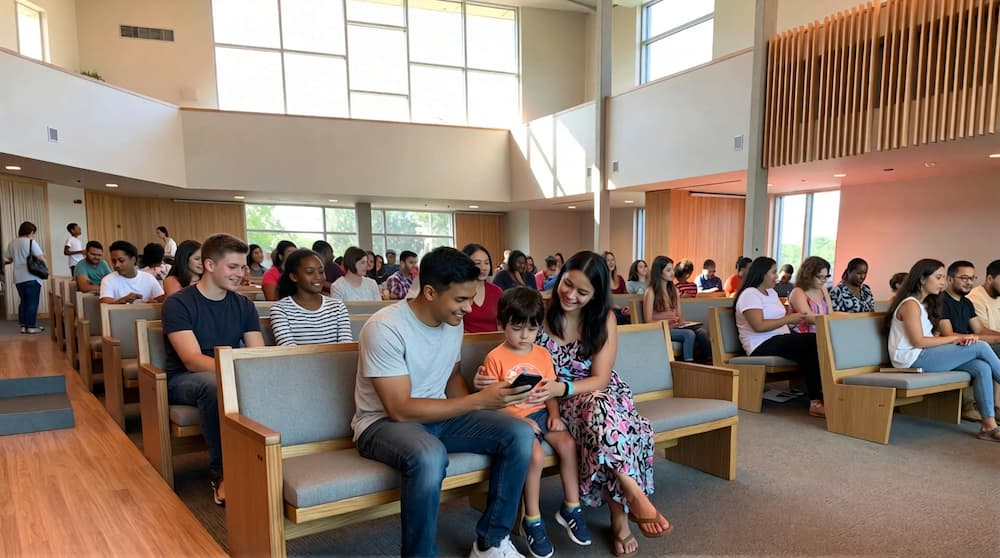3 Ways Pastors Can Utilize AI and ChatGPT for More Efficient Ministry
AI has the power to transform the Church, but ethical concerns remain about its impact on human interaction and decision-making. Here are three ways pastors can use AI and ChatGPT for a more efficient ministry.
.jpeg)
Artificial intelligence (AI) is a hot topic, sparking debate among pastors, writers, and ministry leaders. Some see it as an invaluable tool, while others fear it may diminish human creativity and authenticity. However, like Microsoft Word, Grammarly, or even a church website, AI is simply a tool—one that, when used wisely, can greatly enhance a pastor’s efficiency in ministry.
ChatGPT, a powerful AI-driven language model, is one such tool that can assist pastors in various ways, from sermon preparation to answering congregants' questions. AI won’t replace a pastor’s personal relationship with God or the unique calling to shepherd a congregation, but it can serve as a valuable resource for administrative and research tasks.
Here are three key ways pastors can use AI and ChatGPT to enhance their ministry.
Streamlining Sermon Preparation
No AI tool will ever replace a pastor’s time spent in prayer and personal study of Scripture. That is non-negotiable. However, ChatGPT can be a helpful assistant in sermon preparation by providing quick access to relevant Bible verses, commentary excerpts, and structured outlines.
For example, a pastor could input a prompt like, “What does the Bible say about forgiveness?” ChatGPT would generate a list of Bible passages and potential sermon points. This can serve as a great starting point for deeper study, allowing pastors to focus on refining their message rather than spending excessive time searching for scriptural references.
Russell Moore, writing for Christianity Today, notes that ChatGPT can mimic the writing styles of well-known figures like Charles Spurgeon or John Piper. While this is fascinating, AI can never replace a sermon bathed in prayer and Holy Spirit-led discernment. Rather, it should be seen as an aid—much like Bible commentaries or sermon-planning software—helping pastors structure their thoughts more efficiently.
Have You Tried It?
If you've used ChatGPT in sermon preparation, what has your experience been like? Has it helped, or do you have concerns?
Assisting with Theological and Practical Questions
Pastors are often asked challenging theological or life-related questions. While no one expects a pastor to have every answer instantly, AI can be a great tool for preparing well-informed responses.
For example, if a pastor anticipates being asked, “What does the Bible say about the end times?” they could input this query into ChatGPT beforehand. The AI would generate relevant Bible passages and commentary insights, allowing the pastor to cross-reference, verify, and refine their response.
It’s important to note that AI is not infallible—it reflects the data it has been trained on. That means pastors should always fact-check AI-generated responses against Scripture and trusted theological resources. However, using AI as a research tool can be similar to using Google, Bible software, or seminary textbooks—it helps pastors be better prepared.
Breaking Language Barriers for Greater Outreach
In today’s multicultural world, pastors often serve congregations with members who speak different languages. AI tools like ChatGPT can help bridge these gaps by providing quick and accurate translations of sermons, study materials, or church announcements.
For instance, if a pastor wants to make their sermon notes accessible to Spanish-speaking members, they can input their notes into ChatGPT and request a Spanish translation. This can also apply to other languages, making church resources more inclusive and expanding the reach of the Gospel.
This is no different than using Google Translate or similar tools. AI-powered translation provides another means of removing language barriers, ensuring that more people can engage with the message of Christ.
Using AI Responsibly in Ministry
While AI can be an incredible asset to pastors, it must be used with wisdom and discernment. Here are a few key points to keep in mind:
- AI should never replace human relationships. Ministry is about people, and no technology can substitute for genuine pastoral care and personal connection.
- Fact-check everything. AI-generated responses should always be cross-referenced with the Bible and trusted theological sources.
- Be mindful of ethical concerns. Like any technology, AI has potential risks, including bias and privacy issues. Pastors should be cautious and responsible in its use.
Final Thoughts: AI Is a Tool, Not a Replacement
AI and ChatGPT, like search engines or Bible study software, are tools that can enhance a pastor’s ministry when used wisely. They should supplement, not replace, the spiritual disciplines of prayer, study, and personal interaction. By leveraging these tools effectively, pastors can free up more time for what truly matters—shepherding their congregation, preaching the Gospel, and fostering meaningful relationships.
Sign Up for Product Updates
Artificial intelligence (AI) is a hot topic, sparking debate among pastors, writers, and ministry leaders. Some see it as an invaluable tool, while others fear it may diminish human creativity and authenticity. However, like Microsoft Word, Grammarly, or even a church website, AI is simply a tool—one that, when used wisely, can greatly enhance a pastor’s efficiency in ministry.
ChatGPT, a powerful AI-driven language model, is one such tool that can assist pastors in various ways, from sermon preparation to answering congregants' questions. AI won’t replace a pastor’s personal relationship with God or the unique calling to shepherd a congregation, but it can serve as a valuable resource for administrative and research tasks.
Here are three key ways pastors can use AI and ChatGPT to enhance their ministry.
Streamlining Sermon Preparation
No AI tool will ever replace a pastor’s time spent in prayer and personal study of Scripture. That is non-negotiable. However, ChatGPT can be a helpful assistant in sermon preparation by providing quick access to relevant Bible verses, commentary excerpts, and structured outlines.
For example, a pastor could input a prompt like, “What does the Bible say about forgiveness?” ChatGPT would generate a list of Bible passages and potential sermon points. This can serve as a great starting point for deeper study, allowing pastors to focus on refining their message rather than spending excessive time searching for scriptural references.
Russell Moore, writing for Christianity Today, notes that ChatGPT can mimic the writing styles of well-known figures like Charles Spurgeon or John Piper. While this is fascinating, AI can never replace a sermon bathed in prayer and Holy Spirit-led discernment. Rather, it should be seen as an aid—much like Bible commentaries or sermon-planning software—helping pastors structure their thoughts more efficiently.
Have You Tried It?
If you've used ChatGPT in sermon preparation, what has your experience been like? Has it helped, or do you have concerns?
Assisting with Theological and Practical Questions
Pastors are often asked challenging theological or life-related questions. While no one expects a pastor to have every answer instantly, AI can be a great tool for preparing well-informed responses.
For example, if a pastor anticipates being asked, “What does the Bible say about the end times?” they could input this query into ChatGPT beforehand. The AI would generate relevant Bible passages and commentary insights, allowing the pastor to cross-reference, verify, and refine their response.
It’s important to note that AI is not infallible—it reflects the data it has been trained on. That means pastors should always fact-check AI-generated responses against Scripture and trusted theological resources. However, using AI as a research tool can be similar to using Google, Bible software, or seminary textbooks—it helps pastors be better prepared.
Breaking Language Barriers for Greater Outreach
In today’s multicultural world, pastors often serve congregations with members who speak different languages. AI tools like ChatGPT can help bridge these gaps by providing quick and accurate translations of sermons, study materials, or church announcements.
For instance, if a pastor wants to make their sermon notes accessible to Spanish-speaking members, they can input their notes into ChatGPT and request a Spanish translation. This can also apply to other languages, making church resources more inclusive and expanding the reach of the Gospel.
This is no different than using Google Translate or similar tools. AI-powered translation provides another means of removing language barriers, ensuring that more people can engage with the message of Christ.
Using AI Responsibly in Ministry
While AI can be an incredible asset to pastors, it must be used with wisdom and discernment. Here are a few key points to keep in mind:
- AI should never replace human relationships. Ministry is about people, and no technology can substitute for genuine pastoral care and personal connection.
- Fact-check everything. AI-generated responses should always be cross-referenced with the Bible and trusted theological sources.
- Be mindful of ethical concerns. Like any technology, AI has potential risks, including bias and privacy issues. Pastors should be cautious and responsible in its use.
Final Thoughts: AI Is a Tool, Not a Replacement
AI and ChatGPT, like search engines or Bible study software, are tools that can enhance a pastor’s ministry when used wisely. They should supplement, not replace, the spiritual disciplines of prayer, study, and personal interaction. By leveraging these tools effectively, pastors can free up more time for what truly matters—shepherding their congregation, preaching the Gospel, and fostering meaningful relationships.
podcast transcript
Artificial intelligence (AI) is a hot topic, sparking debate among pastors, writers, and ministry leaders. Some see it as an invaluable tool, while others fear it may diminish human creativity and authenticity. However, like Microsoft Word, Grammarly, or even a church website, AI is simply a tool—one that, when used wisely, can greatly enhance a pastor’s efficiency in ministry.
ChatGPT, a powerful AI-driven language model, is one such tool that can assist pastors in various ways, from sermon preparation to answering congregants' questions. AI won’t replace a pastor’s personal relationship with God or the unique calling to shepherd a congregation, but it can serve as a valuable resource for administrative and research tasks.
Here are three key ways pastors can use AI and ChatGPT to enhance their ministry.
Streamlining Sermon Preparation
No AI tool will ever replace a pastor’s time spent in prayer and personal study of Scripture. That is non-negotiable. However, ChatGPT can be a helpful assistant in sermon preparation by providing quick access to relevant Bible verses, commentary excerpts, and structured outlines.
For example, a pastor could input a prompt like, “What does the Bible say about forgiveness?” ChatGPT would generate a list of Bible passages and potential sermon points. This can serve as a great starting point for deeper study, allowing pastors to focus on refining their message rather than spending excessive time searching for scriptural references.
Russell Moore, writing for Christianity Today, notes that ChatGPT can mimic the writing styles of well-known figures like Charles Spurgeon or John Piper. While this is fascinating, AI can never replace a sermon bathed in prayer and Holy Spirit-led discernment. Rather, it should be seen as an aid—much like Bible commentaries or sermon-planning software—helping pastors structure their thoughts more efficiently.
Have You Tried It?
If you've used ChatGPT in sermon preparation, what has your experience been like? Has it helped, or do you have concerns?
Assisting with Theological and Practical Questions
Pastors are often asked challenging theological or life-related questions. While no one expects a pastor to have every answer instantly, AI can be a great tool for preparing well-informed responses.
For example, if a pastor anticipates being asked, “What does the Bible say about the end times?” they could input this query into ChatGPT beforehand. The AI would generate relevant Bible passages and commentary insights, allowing the pastor to cross-reference, verify, and refine their response.
It’s important to note that AI is not infallible—it reflects the data it has been trained on. That means pastors should always fact-check AI-generated responses against Scripture and trusted theological resources. However, using AI as a research tool can be similar to using Google, Bible software, or seminary textbooks—it helps pastors be better prepared.
Breaking Language Barriers for Greater Outreach
In today’s multicultural world, pastors often serve congregations with members who speak different languages. AI tools like ChatGPT can help bridge these gaps by providing quick and accurate translations of sermons, study materials, or church announcements.
For instance, if a pastor wants to make their sermon notes accessible to Spanish-speaking members, they can input their notes into ChatGPT and request a Spanish translation. This can also apply to other languages, making church resources more inclusive and expanding the reach of the Gospel.
This is no different than using Google Translate or similar tools. AI-powered translation provides another means of removing language barriers, ensuring that more people can engage with the message of Christ.
Using AI Responsibly in Ministry
While AI can be an incredible asset to pastors, it must be used with wisdom and discernment. Here are a few key points to keep in mind:
- AI should never replace human relationships. Ministry is about people, and no technology can substitute for genuine pastoral care and personal connection.
- Fact-check everything. AI-generated responses should always be cross-referenced with the Bible and trusted theological sources.
- Be mindful of ethical concerns. Like any technology, AI has potential risks, including bias and privacy issues. Pastors should be cautious and responsible in its use.
Final Thoughts: AI Is a Tool, Not a Replacement
AI and ChatGPT, like search engines or Bible study software, are tools that can enhance a pastor’s ministry when used wisely. They should supplement, not replace, the spiritual disciplines of prayer, study, and personal interaction. By leveraging these tools effectively, pastors can free up more time for what truly matters—shepherding their congregation, preaching the Gospel, and fostering meaningful relationships.
VIDEO transcript
Artificial intelligence (AI) is a hot topic, sparking debate among pastors, writers, and ministry leaders. Some see it as an invaluable tool, while others fear it may diminish human creativity and authenticity. However, like Microsoft Word, Grammarly, or even a church website, AI is simply a tool—one that, when used wisely, can greatly enhance a pastor’s efficiency in ministry.
ChatGPT, a powerful AI-driven language model, is one such tool that can assist pastors in various ways, from sermon preparation to answering congregants' questions. AI won’t replace a pastor’s personal relationship with God or the unique calling to shepherd a congregation, but it can serve as a valuable resource for administrative and research tasks.
Here are three key ways pastors can use AI and ChatGPT to enhance their ministry.
Streamlining Sermon Preparation
No AI tool will ever replace a pastor’s time spent in prayer and personal study of Scripture. That is non-negotiable. However, ChatGPT can be a helpful assistant in sermon preparation by providing quick access to relevant Bible verses, commentary excerpts, and structured outlines.
For example, a pastor could input a prompt like, “What does the Bible say about forgiveness?” ChatGPT would generate a list of Bible passages and potential sermon points. This can serve as a great starting point for deeper study, allowing pastors to focus on refining their message rather than spending excessive time searching for scriptural references.
Russell Moore, writing for Christianity Today, notes that ChatGPT can mimic the writing styles of well-known figures like Charles Spurgeon or John Piper. While this is fascinating, AI can never replace a sermon bathed in prayer and Holy Spirit-led discernment. Rather, it should be seen as an aid—much like Bible commentaries or sermon-planning software—helping pastors structure their thoughts more efficiently.
Have You Tried It?
If you've used ChatGPT in sermon preparation, what has your experience been like? Has it helped, or do you have concerns?
Assisting with Theological and Practical Questions
Pastors are often asked challenging theological or life-related questions. While no one expects a pastor to have every answer instantly, AI can be a great tool for preparing well-informed responses.
For example, if a pastor anticipates being asked, “What does the Bible say about the end times?” they could input this query into ChatGPT beforehand. The AI would generate relevant Bible passages and commentary insights, allowing the pastor to cross-reference, verify, and refine their response.
It’s important to note that AI is not infallible—it reflects the data it has been trained on. That means pastors should always fact-check AI-generated responses against Scripture and trusted theological resources. However, using AI as a research tool can be similar to using Google, Bible software, or seminary textbooks—it helps pastors be better prepared.
Breaking Language Barriers for Greater Outreach
In today’s multicultural world, pastors often serve congregations with members who speak different languages. AI tools like ChatGPT can help bridge these gaps by providing quick and accurate translations of sermons, study materials, or church announcements.
For instance, if a pastor wants to make their sermon notes accessible to Spanish-speaking members, they can input their notes into ChatGPT and request a Spanish translation. This can also apply to other languages, making church resources more inclusive and expanding the reach of the Gospel.
This is no different than using Google Translate or similar tools. AI-powered translation provides another means of removing language barriers, ensuring that more people can engage with the message of Christ.
Using AI Responsibly in Ministry
While AI can be an incredible asset to pastors, it must be used with wisdom and discernment. Here are a few key points to keep in mind:
- AI should never replace human relationships. Ministry is about people, and no technology can substitute for genuine pastoral care and personal connection.
- Fact-check everything. AI-generated responses should always be cross-referenced with the Bible and trusted theological sources.
- Be mindful of ethical concerns. Like any technology, AI has potential risks, including bias and privacy issues. Pastors should be cautious and responsible in its use.
Final Thoughts: AI Is a Tool, Not a Replacement
AI and ChatGPT, like search engines or Bible study software, are tools that can enhance a pastor’s ministry when used wisely. They should supplement, not replace, the spiritual disciplines of prayer, study, and personal interaction. By leveraging these tools effectively, pastors can free up more time for what truly matters—shepherding their congregation, preaching the Gospel, and fostering meaningful relationships.




























